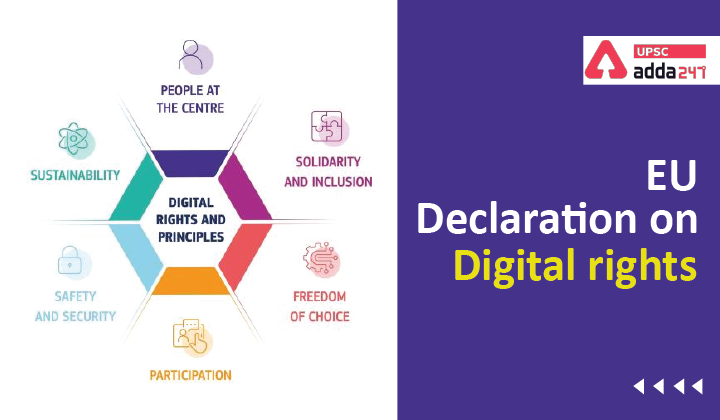Table of Contents
Digital Rights and Principles: Relevance
- GS: Awareness in the fields of IT, Space, Computers, robotics, Nano-technology, bio-technology and issues relating to intellectual property rights.
Digital Rights and Principles: Context
- Recently, in a global first, European Commission has proposed a set of digital rights and principles that aim to protect people’s rights, support democracy and ensure a fair and safe online environment.
EU Declaration on Digital Rights and Principles: Key points
- There rights and principles also cover digital devices, and ensures that the products support the bloc’s sustainability and green transition goals, with details provided on their environmental impact and energy consumption.
- The declaration establishes that what is illegal offline should be illegal online.
- This declaration aims to provide a guide for policymakers and companies when dealing with new technologies.
- The draft declaration on digital rights and principles aims to give everyone a clear reference point about the kind of digital transformation Europe promotes and defends.
Rights and principles in the digital use
The draft declaration covers key rights and principles for the digital transformation, like
- placing people and their rights at its centre,
- supporting solidarity and inclusion,
- ensuring the freedom of choice online,
- fostering participation in the digital public space,
- increasing safety, security and empowerment of individuals, and
- promoting the sustainability of the digital future.
Objective of rights and principles
These rights and principles should accompany people:
- affordable and high-speed digital connectivity everywhere and for everybody,
- well-equipped classrooms and digitally skilled teachers,
- seamless access to public services,
- a safe digital environment for children,
- obtaining easy-to-understand information on the environmental impact of our digital products,
- controlling how their personal data are used and with whom they are shared.
What are digital rights?
- Digital rights are those rights that allow people to access, use, create and publish digital media, as well as access and use computers, other electronic devices and communications networks.
- Digital rights are closely linked to freedom of expression and privacy.
- Digital rights are also called as an extension of human rights in a digital age.
Key digital rights
- Right to access and use computers and/or other electronic devices
- Right to access and use digital content
- Right to create and share digital media
- Right to privacy in digital communities
- Right to express your ideas and opinions freely
- Right to report anyone or anything that seems inappropriate
Key Digital Responsibilities
- Use appropriate language and behavior when interacting with others (i.e. no cyberbullying)
- Respect the opinions and ideas of others
- Obey all intellectual property laws
- Do not use or share others’ work without permission
- Follow rules and/or codes of conduct for every Internet site
- Responsibility to report cyberbullying, threats, and inappropriate use of digital resources



 TSPSC Group 1 Question Paper 2024, Downl...
TSPSC Group 1 Question Paper 2024, Downl...
 TSPSC Group 1 Answer key 2024 Out, Downl...
TSPSC Group 1 Answer key 2024 Out, Downl...
 UPSC Prelims 2024 Question Paper, Downlo...
UPSC Prelims 2024 Question Paper, Downlo...





